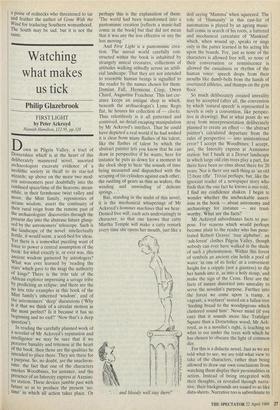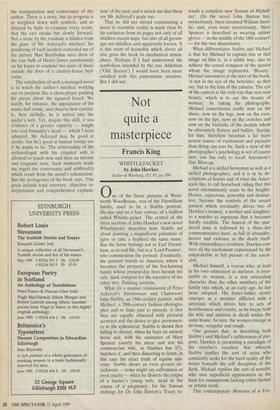Watching what makes us tick
Philip Glazebrook
FIRST LIGHT by Peter Ackroyd
Hamish Hamilton, £12.95, pp.328
Down in Pilgrin Valley, a tract of Dorsetshire which is at the heart of this deliberately mannered novel, assorted archaeologists excavate evidence of a neolithic society in thrall to its star-led wizards; up above on the moor two mod- ern astronomers peer doubtfully into the confused space/time of the heavens; mean- while, in their farmhouse twixt valley and moor, the Mint family, repositories of arcane wisdom, assert the continuity of their rural reign from the remote past of the archaeologists' discoveries through the Present day into the abstruse future glimp- sed by the astronomers' telescope. Such is the landscape of the novel: intellectually fertile, it would seem, a seed-bed for ideas. Yet there is a somewhat puzzling want of force to power a central assumption of the book: for.what exactly is, or ever was, this ancient wisdom garnered by astrologers? What was ever learned by 'reading the stars' which gave to the magi the authority of kings? There is the trite tale of the African explorer impressing a savage tribe by predicting an eclipse; and there are the no less trite examples in this book of the Mint family's inherited `wisdom', and of the astronomers' deep' discussions ('Why is it that we think of a circular motion as the most perfect? IS it because it has no beginning and no end?' Now that's a deep question'). In reading the carefully planned work of a novelist of Mr Ackroyd's reputation and intelligence we may be sure that if we Perceive banality and triteness at the heart of the book, then those are the qualities he intended to place there. They are there for a purpose. So, no doubt, are the anachron- isms: the fact that one of the characters smokes Woodbines, for instance, and the Presence of an Intercity express at Axmins- ter station. These devices jumble past with future so as to produce the present 'no- time' in which all action takes place. Or perhaps this is the explanation of them: `The world had been transformed into a pantomimic creation [reflects a music-hall comic in the book] but that did not mean that it was any the less effective or any the less moving.'
And First Light is a pantomimic crea- tion. The unreal world carefully con- structed within the book is inhabited by strangely unreal creatures, collections of attitudes walking stiltedly across an artifi- cial landscape. That they are not intended to resemble human beings is signalled to the reader by the names chosen for them: Damian Fall, Hermione Crisp, Owen Chard, Augustine Fraicheur. This last cre- ature keeps an antique shop in which, beneath the archaeologist's Lyme Regis flat, he houses his collection of — clocks. Thus relentlessly is it all patterned and contrived, no detail escaping manipulation by Mr Ackroyd's intellect. That he could have depicted a real world if he had wished it is clear from many flashes of his talent, like the flashes of talent by which the abstract painter lets you know that he can draw in perspective if he wants; here for instance he puts us down for a moment in the clock shop to hear `the sounds of time being measured and dispatched with the scraping of tin cylinders against each other, the rustling of gears as thin as wafers, the winding and unwinding of delicate springs...'.
But, standing in the midst of this novel, it is the mechanical whisperings of Mr Ackroyd's hommes machines that we hear. Denied free will, each acts undeviatingly in character, so that one knows that catty Martha Temple will make a catty remark every time she opens her mouth, just like a . . and bloody well stay there!' doll saying `Mamma' when squeezed. The role of 'Humanity' in this cast-list of automatons is played by an ageing music- hall comic in search of his roots, a battered and mechanical caricature of `Mankind' which, when wound up, speaks or sings only in the patter learned in his acting life upon the boards. For, just as none of the characters is allowed free will, so none of their conversation or reminiscence is allowed the casualness or rhythm of the human voice: speech drops from their mouths like dumb-bells from the hands of overtaxed athletes, and thumps on the gym floor.
So much deliberately created unreality may be accepted (after all, the convention by which `natural speech' is represented in novels is only a convention, like perspec- tive in drawing). But at what point do we stray from misrepresentation deliberately planned to create an effect — the abstract painter's calculated departure from the rules of perspective — into unintentional error? I accept the Woodbines; I accept, just, the Intercity express at Axminster station: but I baulk at a Dorset landscape in which large old elm-trees play a part, for there have been no elms about there for 20 years. Nor is there any such thing as 'an old 12-bore rifle'. Trivial perhaps; but, like the ignorant reader of a newspaper story who finds that the one fact he knows is mis-told, I find my confidence shaken. I begin to wonder whether the uncheckable assert- ions in the book — about astronomy and archaeology for instance — are trust- worthy. What are the facts?
Mr Ackroyd subordinates facts to pur- pose. For reasons which would perhaps become plain to the reader who has pene- trated Robert Graves' tree alphabet', an `ash-forest' clothes Pilgrin Valley, though nobody can ever have walked in the shade of such a phenomenon. Within this forest of symbols an ancient elm holds a pool of water 'in one of its forks' at a convenient height for a cripple (not a giantess) to dip her hands into it, as into a holy stoup, and make the sign of the Cross. Here are the facts of nature distorted into unreality to serve the novelist's purpose. Further into the forest we come upon `a tramp, a vagrant, a wayfarer' seated on a fallen tree 'feeding bread to the woodpigeons which clustered round him'. Never mind (if you can) that it sounds more like Trafalgar Square than a Dorsetshire wood; Mr Ack- royd, as is a novelist's right, is teaching us what to see under the trees with which he has chosen to obscure the light of common day.
For this is a didactic novel. Just as we are told what to see, we are told what view to take of the characters, rather than being allowed to draw our own conclusions from watching them display their personalities in action. Instead of being integrated with their thoughts, or revealed through narra- tive, their backgrounds are issued to us like data-sheets. Narrative too is subordinate to the manipulation and contrivance of the author. There is a story, but its progress is so weighted down with symbols, and so delayed by halts to examine every event, that the cart creaks but slowly forward. Not a stone by the roadside is hidden from the glare of Mr Ackroyd's intellect; his pondering of each incident reminded me of the picture Max Beerbohm once drew of the vast bulk of Henry James ponderously on his knees to examine two pairs of shoes outside the door of a country-house bed- room.
The satisfaction of such a managed novel is to watch the author's intellect working out its purpose like a chess-player pushing his pieces about the squared board. We watch, for instance, the appearance of the music-hall comic, and observe how careful- ly, how skilfully, he is netted into the spider's web. Yet, despite this skill, it was evidence of a greater capacity — insight into real humanity's heart — which I most admired. Mr Ackroyd may be good at clocks, but he's good at human beings too if he wants to be. The relationship of the archaeologist with his crippled wife is allowed to touch now and then an intense and poignant note. Such moments made me regret the contrivance and artificiality which result from the novel's schematism. But the protagonist of the book says, 'Our goals include total recovery, objective in- terpretation and comprehensive explana-
tion' of the past; and it struck me that these are Mr Ackroyd's goals too.
That he did not intend constructing a novel to resemble reality is made clear by his exclusion from its pages not only of all children except imps, but also of all grown- ups not childless and apparently barren. It is this want of fecundity which above all else gives the book its mechanical atmos- phere. Perhaps if I had understood the symbolism intended by the star Aldebran ('Old. Barren') I would have been more satisfied with this pantomimic creation. But I did not.



































































 Previous page
Previous page